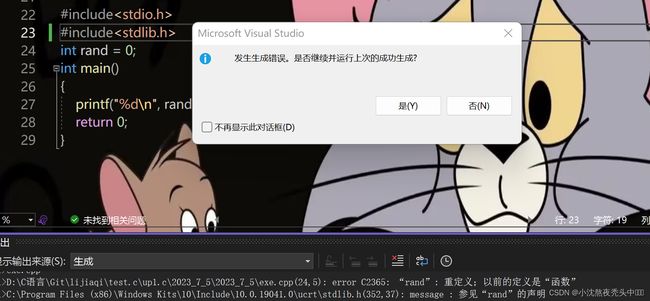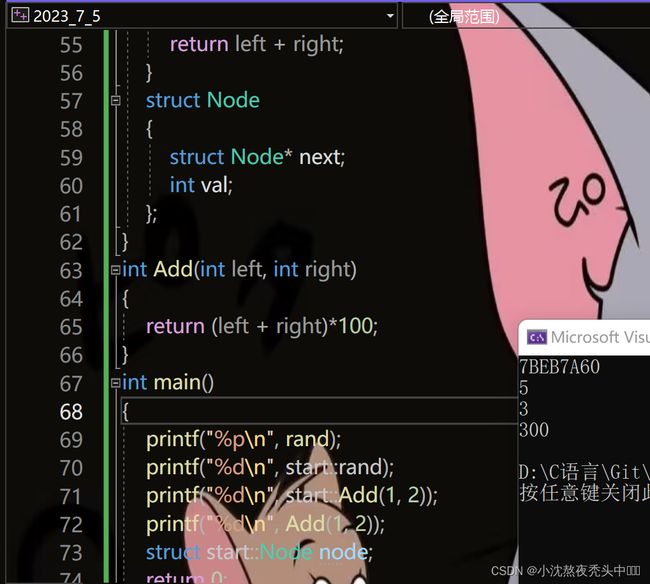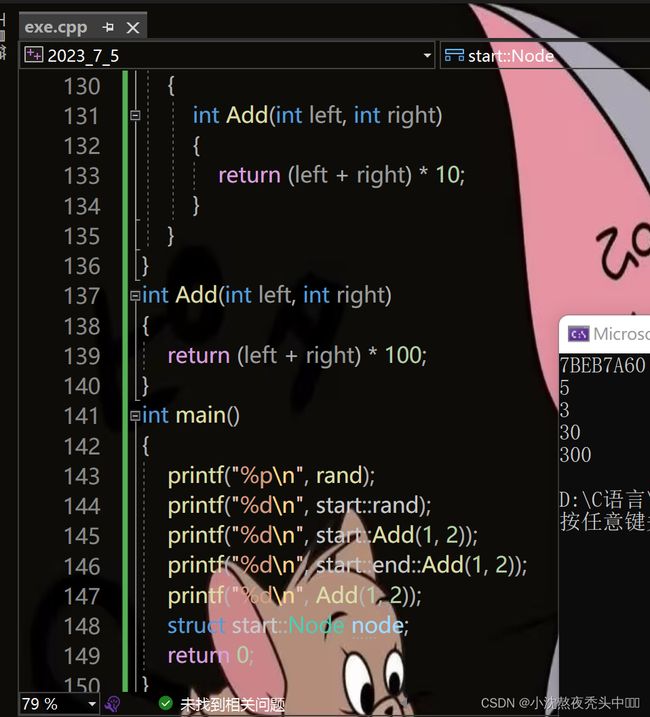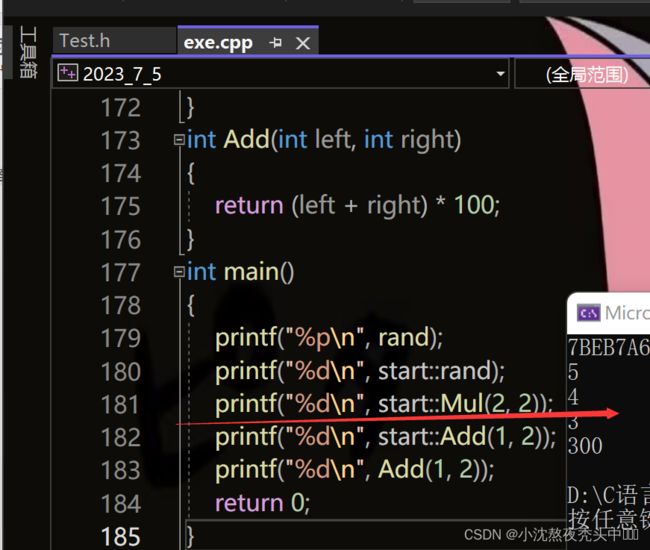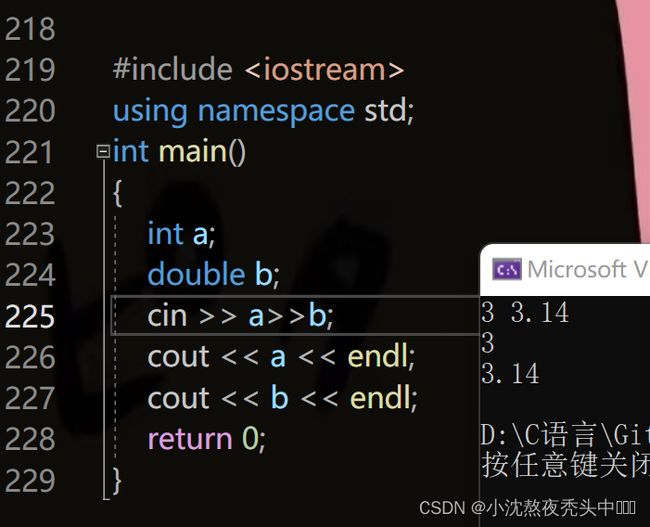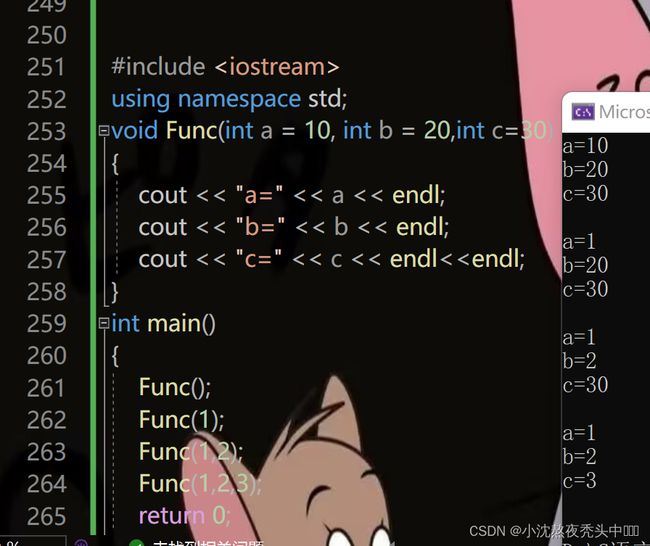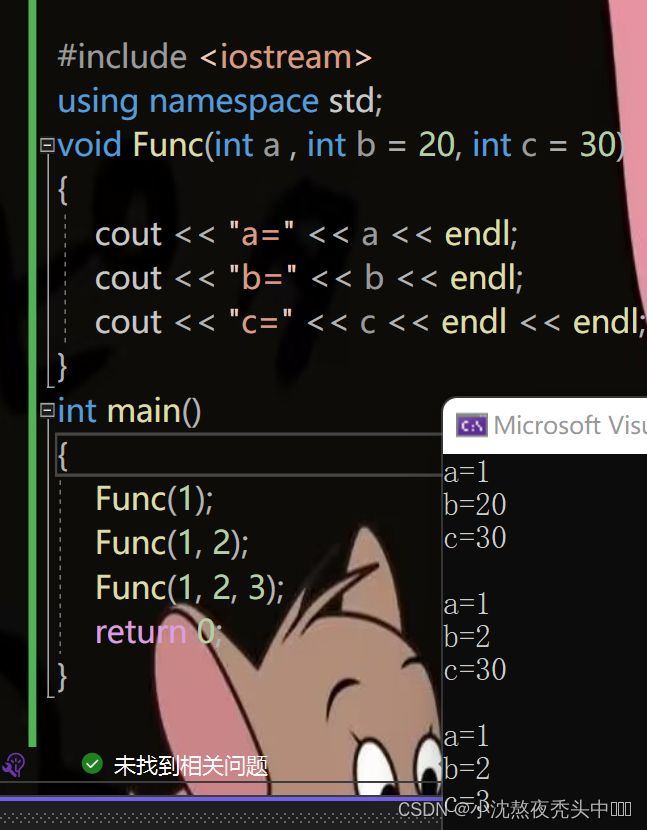【C++初阶】---C++入门篇
文章目录
- 前言
- 一、C++历史介绍
- 二、命名空间
-
- 2.1.C与C++对比
- 2.2.命名空间的引入
- 2.3.命名空间定义
- 2.4.命名空间的使用
- 2.5.对上述C与C++对比中的第二个不同点的解释:
- 三、C++输入&输出(对第三个不同点的解释)
- 四、缺省参数
-
- 4.1.缺省参数的概念
- 4.2.缺省参数分类
- 总结
前言
个人主页:@小沈熬夜秃头中୧⍤⃝❅
小编介绍:欢迎来到我的乱七八糟小星球
专栏:C++
本章内容:C++入门(一)
送给各位:
记得 评论 +点赞 +收藏 +关注哦~
一、C++历史介绍
C语言最初由 Dennis Ritchie 于 1969 年到 1973 年在 AT&T 贝尔实验室里开发出来,主要用于重新实现 Unix 操作系统。此时,C语言又被称为 K&R C。其中,K 表示 Kernighan 的首字母,而 R 则是 Ritchie 的首字母。
C语言一般分为GUN C 、ANSI C、标准C,在了解这几个术语对应的C标准之前,我们需要先了解三个组织,分别是自由软件基金会,美国国家标准学会以及国际标准化组织。下面对其三个组织进行简单说明:
- 自由软件基金会:是美国的一个民间非营利组织,致力于推进自由软件,其中linux与gnu就是由这个组织在维护。
- 美国国家标准学会:听名字就知道这是美国用于制定自己国家标准各类标准的组织(政府组织)
- 国际标准化组织:作用同美国国家标准协会相似,只是这个组织的目标更远大一些,致力于制定国际标准。
其中GNU C 是软件自由基金会制定的标准,ANSI C 是由美国国家标准学会制定的标准,而ISO C则是由国际标准化组织制定的标准,当前是一个国际化的时代,都在追求标准,那么这个标准化肯定不能是某一个国家的标准,那么这个标准肯定要有国际标准化组织来制定,所以我们常说的标准C其实就是ISO C,下面统称为标准C。
大约在90年代,美国国家标准学会与国际标准化组织相互接纳吸收对方的标准,所以当前标准C 与ANSI C的标准其实是一样的。GNU C 主要应用于linux开发,比标准C支持更多的特性,使用起来更加灵活,所以 标准C = ISO C = ANSI C ≠ GNU 。
二、命名空间
2.1.C与C++对比
#include#include
- 包含的头文件不同
- C包含的头文件是#include
- C++包含的头文件是#include< iostream >
- C++相比于C多了一行using namespace std;
- 两者的打印形式不同
- C的打印形式是printf(“hello world\n”);
- C++的打印形式是cout << “hello world” << endl;
2.2.命名空间的引入
在C/C++中,变量、函数和后面要学到的类都是大量存在的,这些变量、函数和类的名称将都存在于全局作用域中,可能会导致很多冲突。使用命名空间的目的是对标识符的名称进行本地化,以避免命名冲突或名字污染,namespace关键字的出现就是针对这种问题的
#include当用C打印一个变量时,大多数是可以的,但是也有意外就像rand,都知道rand在库中是一个函数当包含了相应的头文件就会发生命名冲突的问题而导致无法打印
可以看到当包含了对应的头文件就会造成冲突,给出的报错是rand重定义,以前的定义是函数
C语言没办法解决类似这样的命名冲突问题,所以C++提出了namespace来解决
2.3.命名空间定义
定义命名空间,需要使用到namespace关键字,后面跟命名空间的名字,然后接一对{}即可,{}中即为命名空间的成员
#include#include在运行结果中可以看出当在命名空间中定义函数时和在全局定义函数时运行结果是不一样的所以也不会造成命名冲突同时定义结构体,访问时要注意是在struct后面+start::而非start::struct Node node;
#include//Test.h
namespace start
{
int Mul(int left, int right)
{
return left * right;
}
}
//exe.cpp
#include2.4.命名空间的使用
int main()
{
printf("%d\n", N::a);
return 0;
}
using N::b;//部分展开
int main()
{
printf("%d\n", N::a);
printf("%d\n", b);//所以代码是将命名空间中b成员引入,当它去全局变量中搜索时,看到using N::b;就知道在命名空间中搜索b
return 0;
}
using namespce N;//全部展开
int main()
{
printf("%d\n", N::a);
printf("%d\n", b);
Add(10, 20);
return 0;
}
这种是很危险的行为,因为using namespace N是将命名空间N全部展开,假设里面有如上出现的rand,那么全部展开就会出现命名冲突问题,所以保险的方式是采用部分展开也就是using N::b;(上面一种形式)
2.5.对上述C与C++对比中的第二个不同点的解释:
#include
- using namespace std; — 就是将std全部展开
- std是C++标准库的命名空间
当不展开using namespace std;是不能编译通过的,因为cout 和 endl都是定义在头文件里的,头文件里的定义是把分到一个叫std的命名空间里的,没有展开命名空间默认是不可以到名命名空间中搜索的,所以会报错
#include#include三、C++输入&输出(对第三个不同点的解释)
#include
- 使用cout标准输出对象(控制台)和cin标准输入对象(键盘)时,必须包含< iostream >头文件以及按命名空间使用方法使用std。
- cout和cin是全局的流对象,endl是特殊的C++符号,表示换行输出,他们都包含在包含< iostream >头文件中。
- <<是流插入运算符,>>是流提取运算符。
- 使用C++输入输出更方便,不需要像printf/scanf输入输出时那样,需要手动控制格式。
C++的输入输出可以自动识别变量类型。- 实际上cout和cin分别是ostream和istream类型的对象,>>和<<也涉及运算符重载等知识
#include std是C++标准库的命名空间,如何展开std使用更合理呢?
- 在日常练习中,建议直接using namespace std即可,这样就很方便。
- using namespace std展开,标准库就全部暴露出来了,如果我们定义跟库重名的类型/对
象/函数,就存在冲突问题。该问题在日常练习中很少出现,但是项目开发中代码较多、规模大,就很容易出现。所以建议在项目开发中使用,像std::cout这样使用时指定命名空间 +
using std::cout展开常用的库对象/类型等方式。
四、缺省参数
4.1.缺省参数的概念
缺省参数是声明或定义函数时为函数的参数指定一个缺省值。在调用该函数时,如果没有指定实参则采用该形参的缺省值,否则使用指定的实参。
void Func(int a = 0)
{
cout<<a<<endl;
}
int main()
{
Func(); // 没有传参时,使用参数的默认值 --- 0
Func(10); // 传参时,使用指定的实参 --- 10
return 0;
}
4.2.缺省参数分类
#include #include //a.h
void Func(int a = 10);
// a.cpp
void Func(int a = 20)
{}
注意:如果生命与定义位置同时出现,恰巧两个位置提供的值不同,那编译器就无法确定到底该用那个缺省值
- 半缺省参数必须从右往左依次来给出,不能间隔着给
- 缺省参数不能在函数声明和定义中同时出现,声明给定义不给
- 缺省值必须是常量或者全局变量
- C语言不支持(编译器不支持)
总结
Ending,今天的C++入门的内容就到此结束啦~,如果后续想了解更多,就请关注我吧,一键三连哦 ~

